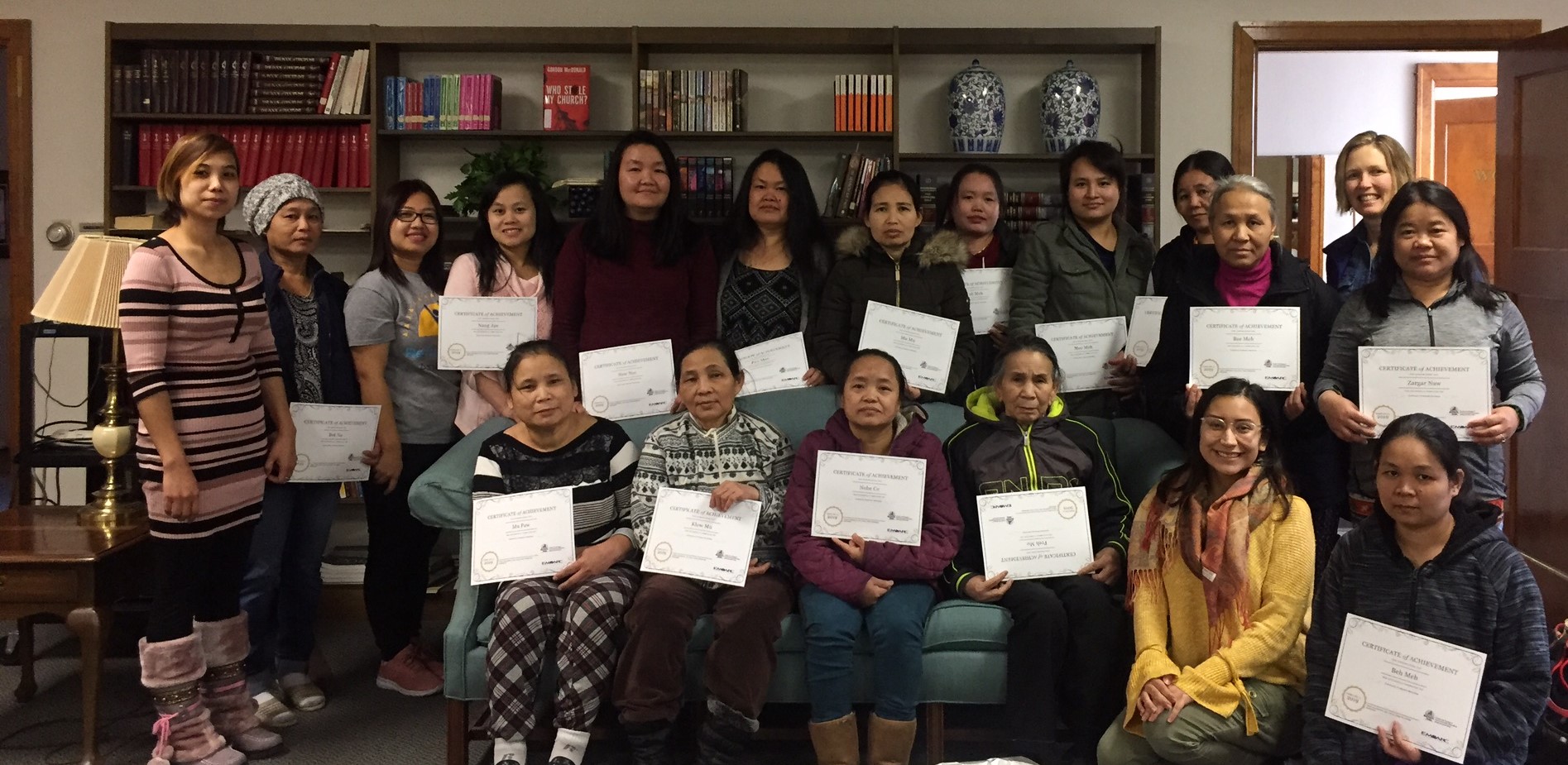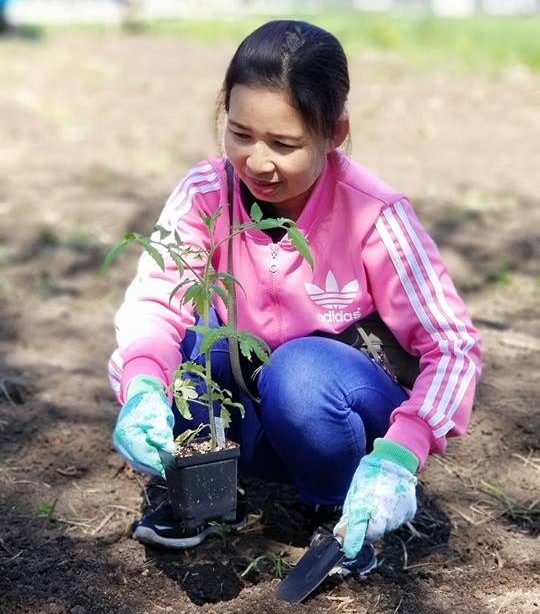Community Producers Program
An economic empowerment program for refugee women.Participants
- Refugee newcomers from Burma/Myanmar in Waterloo, Iowa, many of whom lived previously in Chicago and New York City.
Desired Outcomes
The CPP promotes skill development among participants through workshops concerning business management, customer service, food safety, marketing, and cash handling. By participating in the CPP market garden, women gain new income sources and build food security in their local community. Finally, the CPP shows the outside community that refugee women can contribute positively to Waterloo.
How this project/organization build relationships
- While working in the garden, participants eat meals together and socialize. Gradually, some of them assume leadership positions contribute so they can “train the trainer”. As produce is harvested, the producers sell it to local wholesalers. They use the entrepreneurial skills developed in CPP workshops to pitch and cultivate a business relationship. Producers also donate native fruits and vegetables to food insecure families in the Karen and Karenni community every week.
- CPP employees attend coalition meetings through EMBARC and UNI Local Food Program staff, including the Cedar Valley Regional Food and Farm Network. In June 2018 the garden was part of a Practical Backyard Tour where the Cedar Valley coalition could tour and learn about gardens. The CPP is considering establishing a similar event in the future for people to learn more about the garden and producers.
Costs
- Adequate grant funding for operational costs that include staff time, child care, translators, catering, and gardening tools
- Paid employees involved with CPP:
- 1 UNI Local Food Program Manager
- 1 EMBARC staff
- Contracted translators and childcare workers
- Contracted caterer
- 2 RefugeeRISE Americorps members
- At certain times 1-2 UNI Local Food Program AmeriCorp members
- Total Projected Expenses (2018): $24,000
Time resources
- Garden set-up process took staff 6-8 months
- Project manager time commitment average 10% per week but varies depending on the time of year.
- 10-30% additional staff time with AmeriCorp VISTA and/or RefugeeRISE AmeriCorps members
- 12-15 hours per week from 10-15 community members in the garden during harvest season
- In-kind and volunteer time
Other resources
- EMBARC staff members and RefugeeRISE AmeriCorps members help arrange connections to wholesale buyers and local farmer’s market
- Transportation for producers from their jobs, homes, and classes
- Arable land from the City of Waterloo
- Water access from the Waterloo Fire Department
Direct Partners
- University of Northern Iowa Local Food Program
- Ethnic Minorities of Burma Advocacy and Resource Center (EMBARC)
- AmeriCorp Volunteers in Service To America (VISTA)
- RefugeeRISE AmeriCorps members
- First Baptist Church co-signed the land lease for the garden
- First United Methodist Church provides a rent-free space for workshop classes
- Waterloo Fire Department provides water access for the garden
Fiscal Sponsors
- University of Northern Iowa (UNI)
- Iowa Women’s Foundation– grant funding helped cover expenses in 2018 and 2019.

Our Story: The CPP filled the void of a previously promised garden project that never happened, and “restored refugee community members’ trust in the outside community.''
University of Northern Iowa Local Food Program and EMBARC staff established the Community Producers Program (CPP) in 2017 to connect Karen and Karenni refugee newcomers with other community members and develop their agricultural skills. In addition, the CPP educates participants about common business practices and provides them with basic entrepreneurial skills. Participants build this skill set through an eight-day workshop at the local First United Methodist Church every February focused on hands-on participation, “rather than just sitting” as stated by Project Manager Jodie Huegerich. Activities include farm and local restaurant visits that teach refugees skills ranging from food safety to cash handling. Many participants show up to the workshop during their lunch hour because they work full-time, have children, and take English classes. The Iowa Women’s Foundation (IWF) provided generous support for lunch, childcare, and interpretation services.
After completing the workshop, participants can work in the market garden. Participants then gain valuable knowledge about local food and markets, and apply this newfound understanding by selling to local wholesalers, creating new sources of income, and building food security. Currently, 15 producers participate regularly. In 2018 the CPP provided garden produce to 20 families in the Karen and Karenni communities every week. Producers generated $300 in sales, which they used to buy new seeds for the 2019 season’s harvest. Altogether, the CPP has restored faith in outside community members and has cultivated an excitement about gardening among its participants.
CPP is a partnership between the UNI Local Food Program, EMBARC, Americorps VISTA, RefugeeRISE Americorps, and First Baptist Church. These organizations provide the connections, recruitment, translation services, and grant funding necessary to operationalize and sustain the CPP’s services. EMBARC recruits and provides assistance for CPP participants. As Huegerich mentions, “UNI had funding, they had people.” Americorps VISTA and RefugeeRISE AmeriCorps members help with coordinating the program. First Baptist Church helped secure the property for the garden as a cosigner on the garden’s lease.
UNI had funding, they had people.
Benefits
Participants gain gardening experience and learn about the benefits of growing and eating local foods. In addition, participants share native fruits and vegetables with food insecure Karen and Karenni families in the community. Collaboration between newcomers and community partners restored faith in outside community members following a previously proposed community garden project that failed.
Challenges
- The CPP seeks a permanent water source for the garden ($2,300 of $6,000 goal raised to pay for it on a GoFundMe page).
- The CPP also has yet to ascertain whether demand exists for future workshops, or for increasing gardening knowledge.
- Working with City staff at the beginning of the project to create a land lease because it was a market garden and not a standard community garden.
Things to Remember
- Start small and be realistic, regardless of the resources at your disposal.
- Communication is key on all levels.
- Funding must be prioritized to offer quality services that incentivize community members to participate.
